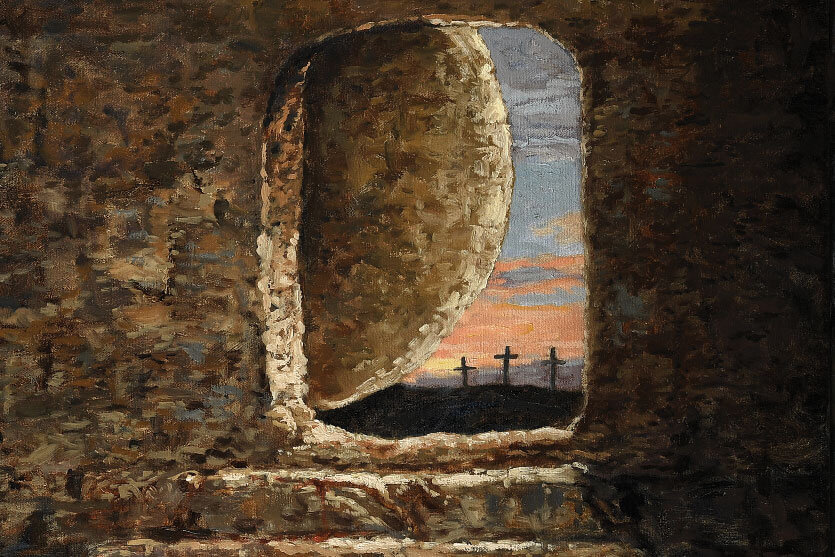PRAY
Loving Father, may I have the power to know the love of Christ that surpasses knowledge (Ephesians 3:18-19).
READ
“Do not let your hearts be troubled. Believe in God, believe also in me.
In my Father’s house there are many dwelling places. If it were not so,
would I have told you that I go to prepare a place for you? And if I go
and prepare a place for you, I will come again and will take you
to myself, so that where I am, there you may be also. And you know
the way to the place where I am going.” Thomas said to him, “Lord,
we do not know where you are going. How can we know the way?”
Jesus said to him, “I am the way, and the truth, and the life. No one
comes to the Father except through me. If you know me, you will know
my Father also. From now on you do know him and have seen him.”
John 14:1-7
Billy Graham tells of when, early in his ministry, he arrived in a small town to preach. Wanting to mail a letter he asked a boy for directions to the post office. After getting directions, Mr. Graham invited the boy to come and hear him preach that night. “I don’t think I’ll be there,” the little boy said, “you don’t even know how to get to the post office.” (Harold Myra, Marshall Shelley, The Leadership Secrets of Billy Graham)
In today’s Scripture Thomas admits being directionally challenged, not knowing where Jesus is going or how to get there. In response Jesus utters one of Scripture’s most momentous statements: “I am the way, and the truth, and the life. No one comes to the Father except through me.” New Testament Greek scholars say that in these three statements about Jesus being the way, truth, and life, Jesus is emphasizing Himself as the way. Jesus is the way inasmuch as He is the truth and the life. Life only exists in Jesus Christ, and truth only exists in Jesus Christ, making Him the way to the Father.
Notably, Jesus does not say He knows the way to the Father, but that He is the way to the Father. He does not say that He will teach the way to the Father, but that He is the way to the Father. Nor does He say that He is one of many ways to the Father. Jesus is the way to the Father, the only way.
Repeatedly throughout John’s Gospel Jesus is revealed as coming from the Father (John 3:13; 3:17; 4:34; 6:29; 6:42; 6:57; 8:42; 14:3; 16:28) and going to the Father. Having come from the Father, Jesus is humanity’s way to the Father. Thus, the first Christians rejoiced in calling themselves people of the Way (Acts 9:2; 22:4). Christianity is not an idea, a theology, or a philosophy, but a person, the Lord Jesus Christ. “The choice is not between the religion Jesus offers and the religion others offer; the choice is between having him as the way to God, or not coming to God at all.” (Iain D. Campbell, I Am: Exploring the “I Am” Sayings of John’s Gospel)
In the midst of the exclusivity of Jesus being the only way to the Father is the inclusivity of “many dwelling places” in His Father’s house. There is room, plenty of room in the Father’s house to which Jesus takes us.
Life with the Father is not just pie in the sky but something believers can actually experience in the here and now. For Jesus promises us an experiential knowledge, a lived experience of really knowing the Father: “If you know me, you will know my Father also. From now on you do know him and have seen him.” Through the Lord Jesus we don’t just know about the Father. But through Jesus we can actually know the Father and experience His presence. As believers we are invited to experience more and more the fullness of being close to the Father’s heart. This is the journey from mere head knowledge to heart knowledge of God!
REFLECT
- Take a few moments to sit comfortably or kneel in the Father’s welcomingpresence. Once you have become still before God, say slowly andprayerfully, “Abba, I belong to you… Abba, I belong to you.” Repeat these words for several moments, concluding with the Lord’s Prayer. This way of praying is taught by Brennan Manning in his book Abba’s Child.
O most merciful Redeemer, Friend and Brother, may I know Thee more clearly, love Thee more dearly, and follow Thee more nearly, day by day.
Richard of Chichester (1197-1253)



